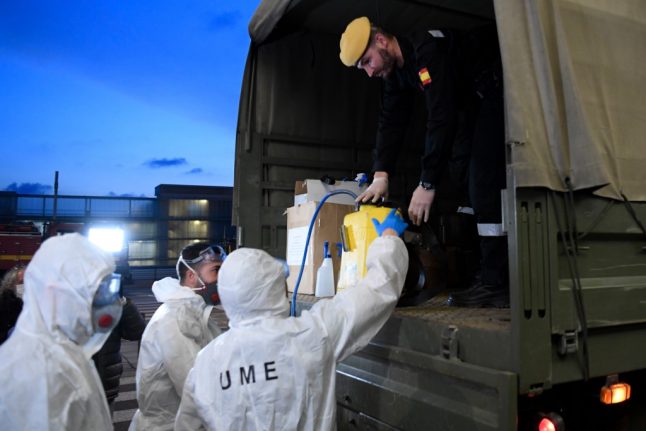We have chosen to make this article completely free for everyone. Please support our website and our coverage by considering joining as a member. Scroll to the bottom for more information.
The number of cases also soared to 19,980, after another 2,833 infections were confirmed over the same period, the ministry's emergencies coordinator Fernando Simón said.
According to the latest data, the number of infections has risen by 16.5 percent overnight, which was a drop from the 25-percent increase registered a day earlier, Simón said.
LATEST:
- Coronavirus: Spain orders closure of hotels
- Coronavirus: What you can and can't do during Spain's lockdown
Datos sobre #Coronavirus en España, desde el primer caso inicial, actualizados a las 12h de hoy:
➡Confirmados: 19.980
➡En UCI: 1.141
➡Fallecidos: 1.002
➡Curados: 1.585Toda la información en la web de @sanidadgob: https://t.co/D1SUcy8icy#COVID19 #EsteVirusLoParamosUnidos pic.twitter.com/aJbj0tqk4p
— Salud Pública (@SaludPublicaEs) March 20, 2020
But over the past seven days, the number of deaths has risen 10-fold, the figures show.
Since the last update around midday on Thursday, another 2,833 infections have been confirmed, taking the overall number of cases to 19,980, the ministry's emergencies coordinator Fernando Simon said.
But he said it was “very likely that the figures underestimated the overall number” of people with the virus, saying the testing laboratories were “overwhelmed” which could skew the numbers.
Of those diagnosed, 52 percent were in hospital and around six percent were being treated in intensive care.
Madrid remains the worst-hit area, accounting for 7,165 cases, or 36 percent of the total infections in Spain, while the number of deaths in the capital rose to 628 — around 63 percent of the national total.
Government figures show that 1,585 cases have recovered, three-quarters of whom are in the Madrid region.
Meanwhile, Madrid and Barcelona announced on Friday they would set up field hospitals in their biggest exhibition halls to deal with the anticipated growth in the number of patients.
In Madrid, the IFEMA conference centre would be fitted with 5,500 hospital beds, part of it dedicated to an intensive care unit, while a section of the Fira de Barcelona centre would be similarly equipped, city authorities said.
Over the last few hours, a total of 2,640 troops had disinfected the country's main airports and ports along with retirement homes and prisons, General Miguel Angel Villarroya, chief of the defence staff, told the same news conference.

On Thursday, police arrested 55 people for not respecting the lockdown that was put in place at the weekend, under which Spain's 46 million population can only leave home to shop for food or medicine, go to the hospital or go to work.
National police chief Jose Angel Gonzalez said there was “a rising trend” in the number of people defying the stay-home order, warned that police were operating with a policy of “zero tolerance”.
Regional authorities in Madrid on Thursday transformed a hotel into a hospital for patients with mild cases of coronavirus to try to keep the health system from being overwhelmed by the pandemic.
READ MORE:
- IN PICS: Madrid's hauntingly quiet streets and dystopian queues of shoppers
- How dogs have become hot property during Spain's coronavirus lockdown



 Please whitelist us to continue reading.
Please whitelist us to continue reading.
Member comments